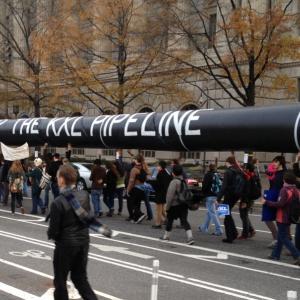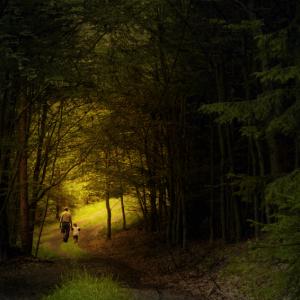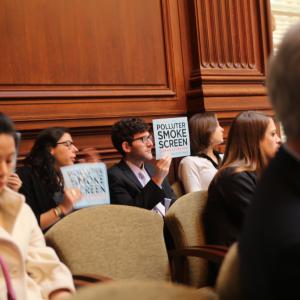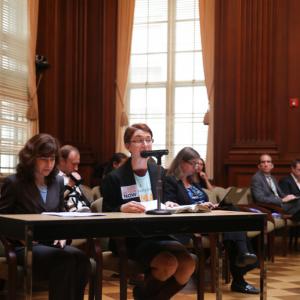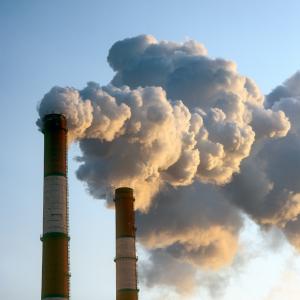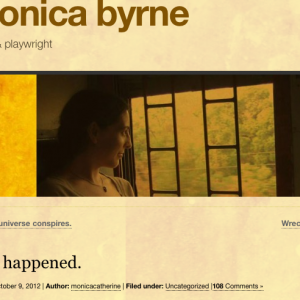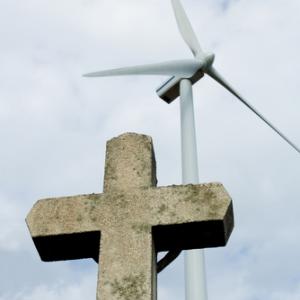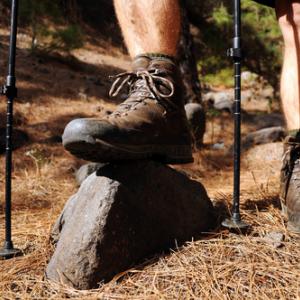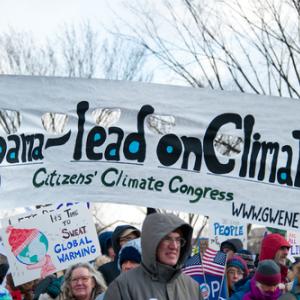
Liz Schmitt is formerly Creation Care Campaign Associate for Sojourners. A graduate of Muhlenberg College and American University, Liz has a B.A. in Environmental Studies and a Master of Public Policy. She has been a passionate advocate for creation care for several years now, in her career in environmental policy and as the Creation Care leader at her church on Capitol Hill.
Liz is from Upstate New York, where it’s impossible not to fall in love with nature. She grew up hiking, hunting and fishing, and came to Washington to combine her love for God’s creation with her love for politics. In her down time, you can find Liz around town, running or walking with foster rescue dogs, cheering with blind hope for the New York Mets, and attempting to grow something edible in her community garden plot.
You can follow her @UCSLiz.
Posts By This Author
Sloth: Missing the Call for Sabbath
Sloth. It’s not just a strange, adorable animal we love to watch in videos. It’s also one of the “Seven Deadly Sins,” and one that I find hanging around in my daily life.
I didn’t think about sloth in particular when I chose my Lenten practices for this year, but it turns out to be the very beast (sorry) I’m trying to walk away from.
To be clear, I’m a pretty active person. I walk to work, run long distance, and I’m also very social. But the fact is, every night I look forward to getting home and enjoying what I tell myself I’ve earned: as much time on the couch watching TV and eating as I want. It’s relaxing, I figure, and takes no mental or physical energy.
This is the proverbial sloth in the room.
Yes, unwinding is good, but here’s the problem: I’m not really getting any rest from this. Sure, I’m lounging, and my brain takes a rest if I’m watching something inane; but as a Christian, rest means something different than it does for other people. Rest means Sabbath. Sabbath is the day of the week that we hold sacred, the day when we rest from our usual work and worries, the day that we give back to God and use to worship God. So ironically, my approach to getting the sloth out of my life is to bring the Sabbath into it, at the end of each day.
Dear Sen. McCain, We Live on Earth, and Climate Change is Real
This week, Secretary of State John Kerry spoke more forcefully about the urgency of climate change than he has before publically, likening it to a weapon of mass destruction. Apparently, such words did not sit well with Sen. John McCain, a politician who was once a pioneer in the political fight against climate change. In response to Kerry, McCain asked, “On what planet does he reside?”
For some context: Kerry has been traveling worldwide. He made his climate change speech in Indonesia, a nation made up of islands that are already experiencing the impacts of climate change. Climate change isalready contributing to changes in rainfall in the country, with serious droughts and flooding, and the threat of significant sea level rise. Furthermore, Indonesians seem more aware of climate change than we are — no surprise given its impact on their entire country. In its Climate Asia project, the BBC found that 63% of Indonesians said the number of trees had decreased and 74% believe that climate change is happening (compared with 68% of Americans). Kerry was speaking about an imminent problem to a nation where most people are aware of that problem.
State Department's Final Review of Keystone XL: Negligible Impact?
Friday at 3 p.m. ET, the State Department released their long-awaited final Supplemental Environmental Impact Statement of the Keystone XL pipeline extension, a proposed project from TransCanada to build a new pipeline for transporting tar sands crude oil from Canada to a refinery in Texas where it will likely be exported internationally.
Environmentalists and concerned citizens on the pipeline’s pathway have been waiting for the State Department to address previously ignored issues like the pipeline’s impact on climate pollution. President Obama said in a climate-focused speech last year that he would only approve Keystone XL if it did not pose a significant risk of climate pollution, so although State Department looked at other environmental risks as well (such as the 1,692 pipeline spills or incidents that occurred from 2002 to 2012 in the United States). This review concludes that the number of U.S. jobs to be created – once estimated in the tens of thousands – will actually be 50 operations jobs, with only 35 permanent. The rest (the touted 42,000 number) are all temporary construction jobs.
Talking to Evangelicals About Climate Change
IN 2013, Sojourners commissioned a messaging study to contribute to the creation care movement—the Christian response to climate change. We polled nearly 1,100 people, oversampling for evangelical Christians, since evangelicals can be politically effective when activated on justice issues, as they have been on immigration, HIV/AIDS, and human trafficking.
Our goal was not only to learn evangelicals’ attitudes about climate change, but also to explore which messages are most compelling so we can better communicate on the issue and make an effective difference for God’s creation.
The first thing we learned was that many of the common stereotypes about evangelicals and climate change simply aren’t true. For one thing, the majority of evangelicals we surveyed (60 percent) agree that climate change is happening, and most say that human activity plays a role.
Second, one’s position on climate change is better predicted by political affiliation than by religion but, interestingly, evangelical Republicans are more likely to support action on climate change than non-evangelical Republicans. Young evangelicals are also more receptive to climate change messages than non-evangelical young people. And for those who don’t agree with us on climate change, there is a low level of certainty: Twenty-five percent of evangelicals are in the moveable middle, either “somewhat sure” that climate change isn’t happening or undecided. This means there’s a good chance that they already care, or that their opinion could be changed.
Stewardship: Being in and Working with Creation
When you hear about stewardship in church, you probably think of your checkbook. Stewardship is the term we use to talk about financially supporting our churches and organizations. But another holy use of the word involves being stewards of creation.
When I hear the word stewardship, I feel the crunch of snow and branches under my feet. I see the trees and paths of the woods owned by my parents’ best friends, where I spent much of my childhood hiking, hunting, skiing, picking apples, and feeding chickadees out of the palm of my hand. It’s one of the places where I gradually heard my calling to work for the care of creation. And the word stewardship transports me to a specific day in my childhood, walking in the woods with my dad’s best friend, Leo, when he pointed to a tree and said he would have to take it down.
How could he kill a tree? I hassled him; I got indignant. I said that nature should be left alone to do her thing. But Leo explained that I was wrong — he managed the land. It wouldn’t be just fine on its own; rather, it needed his careful eye to manage the trails, cut down sick trees, and hunt deer.
8 Simple New Year's Resolutions for Creation Care
On the eve of 2014, why not plan your New Year’s resolutions around caring for God’s creation? Here are eight ideas for EcoResolutions.
'Testifying to the Truth': EPA Testimonies (Part Three)
Editor’s Note: This post contains two of many testimonies given at an Environmental Protection Agency listening session at EPA headquarters in Washington, D.C. The EPA held sessions in 11 regional offices across the country to allow the public to comment on the agency’s plans to begin regulating carbon dioxide emissions — one of the heat-trapping pollutants that contributes to climate change — from existing coal and natural gas-fired power plants. The public was invited to share up to three minutes of spoken testimony to an EPA panel for the agency’s consideration.
My name is Dr. Jalonne L. White-Newsome and I am a federal policy analyst at WE ACT for Environmental Justice, a 25-year-old community based environmental justice organization based in Harlem, N.Y. However, I work out of our Washington, D.C. office, mostly engaging in federal policy. Although I am in a different location, WE ACT D.C. has the same mission: to build healthy communities by insuring all voices help shape environmental policy and practices so that they are fair.
As a public health researcher who has seen the impacts of temperature, air pollution, and climate changes on urban-dwelling seniors in low income communities of color, I am clear about the need for and the importance of the testimony that I, and hopefully other environmental justice organizations, will offer here today. While three minutes is not a lot of time, I do have a couple of "calls to action" to uplift as you continue your work:
- Recognize the deficiency.
- Recognize the cumulative impacts.
'Testifying to the Truth': EPA Testimonies (Part Two)
As President Obama has pointed out, the climate issue is not only a technical one. In his words, “We have a moral obligation to future generations to leave them a planet that is not polluted and damaged.” We in the faith community would, of course, agree. But it is not only future generations that will bear the impacts of climate change. They are being felt now, most intensely by those populations around the world who are least able to cope with them. We must act with great conviction and haste to move toward solutions.
The central principle of the Bahá'í Faith is the oneness of humankind. This principle has deep implications for policy in many arenas. It should guide us to seek solutions that are equitable and just, treating all people as members of one human family. I believe that to be effective, the carbon standards established by EPA over the next several months must be animated by this foundational principle.
'Testifying to the Truth': EPA Testimonies (Part One)
Editor’s Note: This post contains two of many testimonies given at an Environmental Protection Agency (EPA) listening session at EPA headquarters in Washington, D.C. The EPA held sessions in 11 regional offices across the country to allow the public to comment on the agency’s plans to begin regulating carbon dioxide emissions — one of the heat-trapping pollutants that contributes to climate change — from existing coal and natural gas-fired power plants. The public was invited to share up to three minutes of spoken testimony to an EPA panel for the agency’s consideration. We also have multiple other testimonies in parts two and three.
The EPA Is Listening: Power Plants and Carbon Pollution
This week the EPA is holding the last few of its listening sessions around the country — 11 in total by the end of the week – to hear what Americans have to say about the EPA’s plans to tackle climate change.
These listening sessions are our chance to give the EPA our comments in person — everyone can register for a three-minute testimony spot — about the agency’s upcoming rule on carbon pollution from existing power plants.
Scientific American Blog Editor Leaves Over Sexual Harassment Allegations
Last week I found out about the unfolding cases of sexual harassment by a respected science blogger and the head of Scientific American’s blog, Bora Zivkovic. It shocked me because I’ve met the man, though I don’t know him well. And so I read the accounts of the three women science bloggers who exposed him. Thefirst one shocked me and made me angry. And the second one shocked me further, because she wrote of the harassment continuing at a conference I attended. It happened right under my nose.
Women are an important part of the science community, but there’s a group of powerful men who are gatekeepers, and some of them use this power as a tool to be overtly sexual with female bloggers looking to advance their writing careers in the science community. The allegations regarding Bora Zivkovic seem to be hard for many in the science community to swallow because he has been a vocal supporter of women’s importance in the field and has actively nurtured the careers of many bloggers.
Christians Making the Climate Discussion Their Own
There’s a debate happening on The Christian Post, and we’re hearing more and more evangelical voices expressing concern over climate change.
Over the summer, talk radio pundit Rush Limbaugh made a comment about people believing in God and manmade global warming: he said it was “intellectually impossible.” It is not, of course, impossible to have faith in God and to agree with 97 percent of scientists that we are harming God’s creation with climate change. And in response to Rush’s comments, Sojourners sent Mr. Limbaugh a letter signed by more than 9,000 people of faith asking him to correct the record (which he has not yet done).
But Rush Limbaugh’s comments also sparked a conversation on the popular evangelical website, The Christian Post. Two prominent climate scientists who are also evangelical Christians, Dr. Katharine Hayhoe and Dr. Tom Ackerman, responded to Rush in an open letter on site. They told Rush that, contrary to his assumptions, they are compelled to work in their field by both their faith in God and their expertise in atmospheric science.
4 Ways the Shutdown Is Making Us Less Green
During the government shutdown, some cuts have caught the public’s attention more than others. And some people are rejoicing over the cuts faced by the Environmental Protection Agency and other environmental agencies. But the shutdown of our environmental programs is affecting people’s lives in ways that might surprise you.
1. National Parks closures are more than an inconvenience
In some National Parks across the country, employees are stranded. Employees who live on park grounds, like park rangers and concession workers, have no work or pay, and because the parks are closed, they’re not even allowed to take solace in the trails that surround them. And in at least one case, they don’t have any food. About 2,200 employees – 1,800 of them concession workers – are stranded in Grand Canyon National Park. A local food bank has started making deliveries, because those people are going hungry and without pay.
Surprising Stories of Climate Change Here in the U.S.
As the Creation Care campaign associate at Sojourners, my job is to get people thinking about God’s call for us to care about the creation. Usually, I do that from behind a desk in Washington, D.C., but recently I got to do it from a boat out on the bayou in Louisiana, in a tiny community that has been hit by eight disasters in eight years (seven hurricanes and the Deepwater Horizon oil spill). I took 100 people out to the town of Jean Lafitte, less than an hour from New Orleans, to hear from people who live on the front lines of climate change.
One of the obstacles to igniting a passion about climate change is that it feels so abstract; it feels like a future problem, a global problem. But it’s really a here and now problem. We took folks out on the Louisiana bayou to meet with those who are living in the midst of climate change – people who don’t think of themselves as environmentalists, but who can bear witness to the impact that climate change and our use of dirty energy have had on their lives, personally.
The town of Jean Lafitte is an old and diverse town, a close-knit community where faith is important to many people, including the mayor. It’s a town that sounds a lot like the early Christian church. We were told that homelessness is not a problem there – if your neighbor loses her home, why wouldn’t you take her in? We were told that when the state government showed up two weeks after Hurricane Katrina, the town had recovered so quickly that the government thought the hurricane hadn’t hit them. This community comes together, and because it knows how to survive, it often gets forgotten by government responders and by oil companies like BP.
Energy News: What’s Happening This Week
David vs. Goliath: Residents in a Colorado city are fighting their local coal monopoly for the chance to move their city to clean energy. The coal company has more money – a LOT more money – but the organizers have more heart. This short 6-minute video is well worth watching.
40,000 jobs sound pretty good: According to the new 2013 second quarter clean energy report form Environmental Entrepreneurs (E2), clean energy and sustainable transportation projects launched this year created close to 40,000 green jobs in the U.S.
My Netflix Love Affair and My Carbon Footprint
I love Netflix. I love that from the comfort of my couch, I can watch almost an endless selection of movies and TV shows. I’m re-watching all of The West Wing right now, along with most of Washington and probably much of the country. My friend Kat told me recently that she and her fiancé are watching it for the fifth time on Netflix, despite it sitting in a deluxe DVD set above their TV. Why get up to switch DVDs when your streaming player automatically starts the next episode for you?
So I wasn’t too happy when I read that my Netflix habit is seriously energy intensive. In a new article on Salon.com, I learned that watching Netflix streaming for an hour a week uses more energy each year than two new refrigerators. In my household we definitely watch a lot more than an hour a week.
I Would Walk 100 Miles — Grandparents Lead Climate Allies in Walk to D.C. for Climate Action
During the week leading up to the “Summer Heat” demonstrations — protesting the Keystone XL pipeline and urging for action on climate change — about 25 people started a hike from Camp David to Washington, D.C. Midway through the 100-mile hike, they were joined by another 50 people at Harper’s Ferry, W.Va. They called their journey the “Walk for Our Grandchildren.”
The name gives away the motivation — the walker’s sense of duty to future generations to leave a healthy planet. When they reached DC, many were arrested in an act of civil disobedience at the offices of Environmental Resources Management, a consulting firm given the task of writing the environmental review of the Keystone XL pipeline — a firm which also works for TransCanada, the energy company seeking to build the pipeline. Many others spent that Friday night at a church, and joined the Summer Heat demonstrations at the White House the next day.
How I Learned to Stop Worrying and Love the Sparrow
My heart is in creation care. And frankly, it’s stressful. Every day, I learn about new things that are harming the environment. Another species is extinct. Another oil spill has spoiled a neighborhood. Plastic micro-beads in soap are clogging up the Great Lakes. The list is never-ending, and defeating.
But the other day, a Bible verse came to mind. It’s the one where we learn that not one sparrow falls to earth without God noticing. And while the next verse tells us that this is how we know God is especially watching over us, I want to pause for a moment and consider the sparrow part of the equation.
Obama’s Climate Action Plan Paves a Road Ahead
Yesterday was a momentous day for the creation care movement: after years of inaction from Congress, President Obama announced a major, comprehensive plan of action on climate change. President Obama’s new “Climate Action Plan,” which he laid out in a speech at Georgetown University Tuesday, addresses the country’s largest source of climate pollution — carbon dioxide from power plants — as well as boosting energy efficiency standards, renewable energy production on public lands, and resilience for cities, towns and roads.


